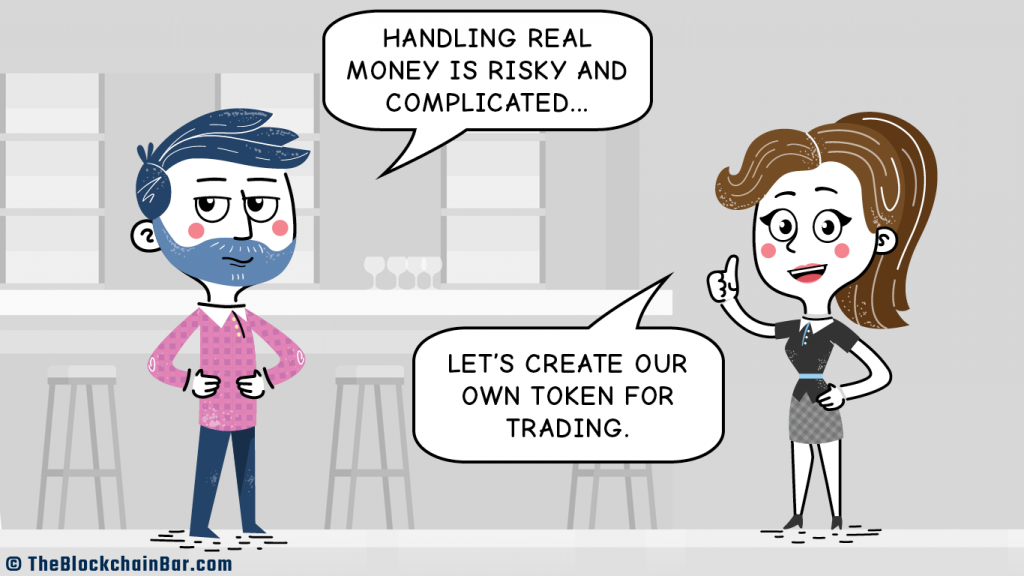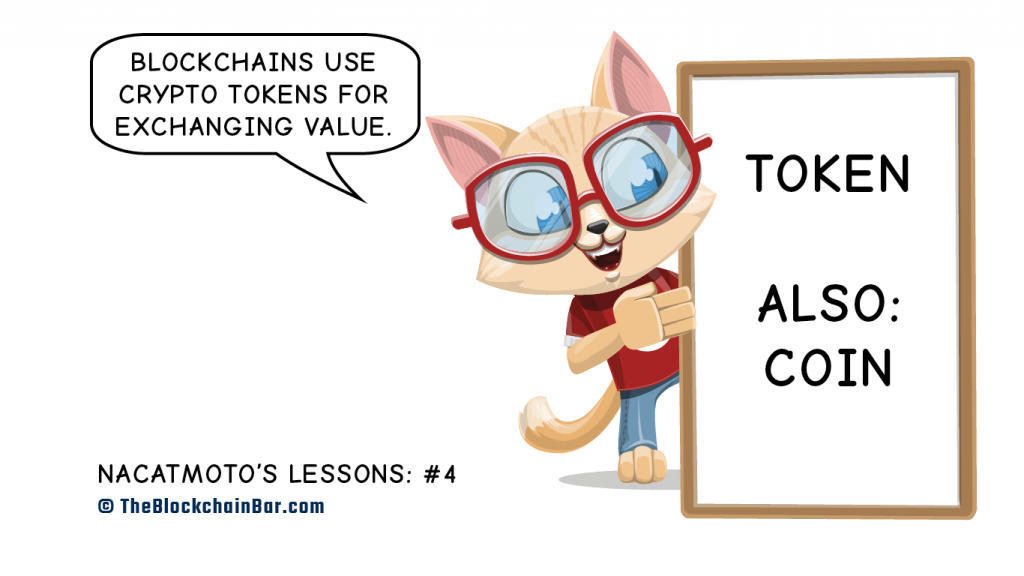Our friends want to run The Blockchain Bar together as equal peers. Now they have to decide how to handle the money.
Sure: Money is great. But it also has real disadvantages. For example, it is complicated to handle – or who likes coins?! Our friends do not want all this hassle.
Oscar shouts: “I’ll handle the money!” – Remember: Oscar is the guy who wanted to drink for free – can they really trust him?
Bob says: “I don’t want him to become the new gatekeeper!”
Alice: “Let’s create our own bar tokens for paying drinks. And we’ll take turns in selling the tokens to new guests at the door.” (In fact, this isn’t really new: Many festivals use drink vouchers to simplify cash management.)
Blockchains adapted this idea and use their own tokens, represented by encrypted transactions. Why? Because tokens can be easily transferred, can be programmed and don’t depend on outside factors, such as banks and currency fluctuations.
But how will they manage the tokens? Find out in the following episodes …
Or maybe you first want to read more about tokens below.
Understanding Blockchain
Crypto tokens make value transfer easy
Money such as the euro or dollar have some attributes that many consider to be problems:
- Handling hard cash (notes or coins) is rather complicated and slow, especially in situations where there are many people handling many transactions in a short time.
- Hard cash is only useful in face-to-face transactions. Hence, it’s almost useless for large parts of the economy in a globalised world.
- Money is controlled by central banks and politicians. It is a stated goal of these institutions to make money lose its value (inflation).
- Electronic money can only be handled by banks. That makes money transfers slow and expensive. Even small transaction fees seem inappropriate, when the real transaction is just sending a few bytes of information from one computer to another. And why does it take days for international transactions to settle, when the bits only need milliseconds to travel around the globe?
Of course, this list is not exhaustive.
Satoshi Nakamoto invented the Bitcoin protocol as a system for money transfers without banks and other central authorities. If the protocol were used for trading dollars or euros, the system would not be fully decentralised as it still depended on elements which are controlled by powerful institutions.
Therefore, Nakamoto did not only create a decentralised system for money transfers, but also the system’s own decentralised money – the ‘Bitcoin’.
In the blockchain scene, these forms of alternative money are called ‘coins’ or ‘tokens’.
Tokens are nothing new. Everyone knows the concept of tokens. Think of airline reward programs, discount tickets, jetons in a casino, or beer vouchers at festivals. They all represent some form of value in a special context without being real money.
For example, in the case of airline reward programs the context might be even rather broad. Usually, you can use airline ‘miles’ not only to pay for flights. You can pay for hotels, rental cars, and many other things. Some companies even pay parts of their employees’ salaries in miles.
And, when you think about it, even a dollar or a euro is just a token. There is no real value in a piece of paper that has a “One” or “One Hundred” printed on it. A dollar is only valuable as long as many people are willing to accept it in exchange for goods and services.
So why not invent your own token that has special purpose, e.g. one token for a glass of beer; or one token for 1 kWh of energy.
And that’s exactly what many blockchain systems do. They create their own tokens for value exchange to get rid of the problems with ‘real’ money. For example, on Ethereum, the second largest blockchain, the token is called ‘Ether’. With Ethers you pay for the computing power used by smart contracts.
In the crypto world there are now hundreds of different tokens for all kinds of purposes. With tokens as a form of value, these systems can operate independently of ‘real’ money like dollars or euros.
And indeed, there is the BeerChain project, which invents a token to buy beer with. (The project has no connection to TheBlockchainBar.com or Blockruption.com.)



